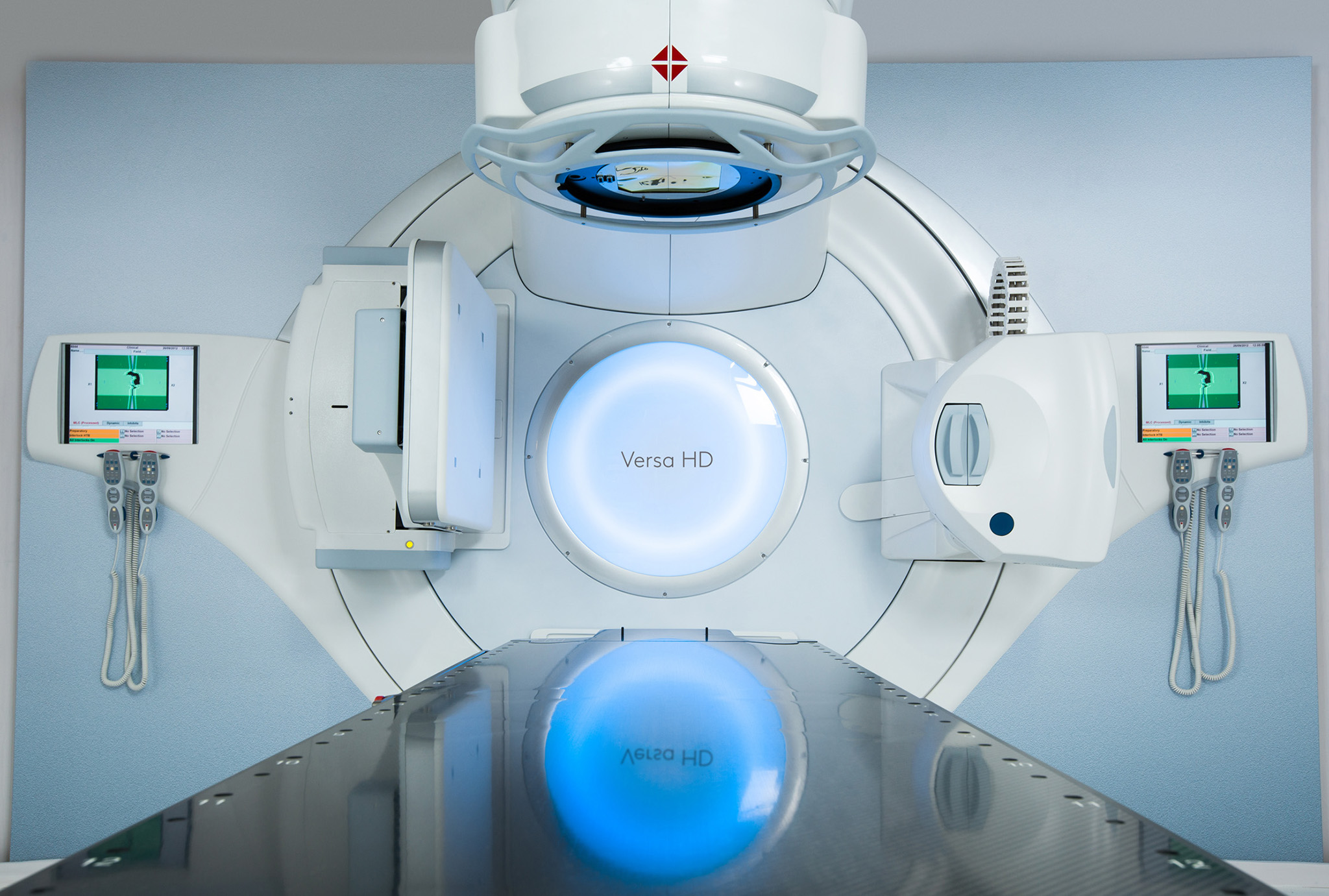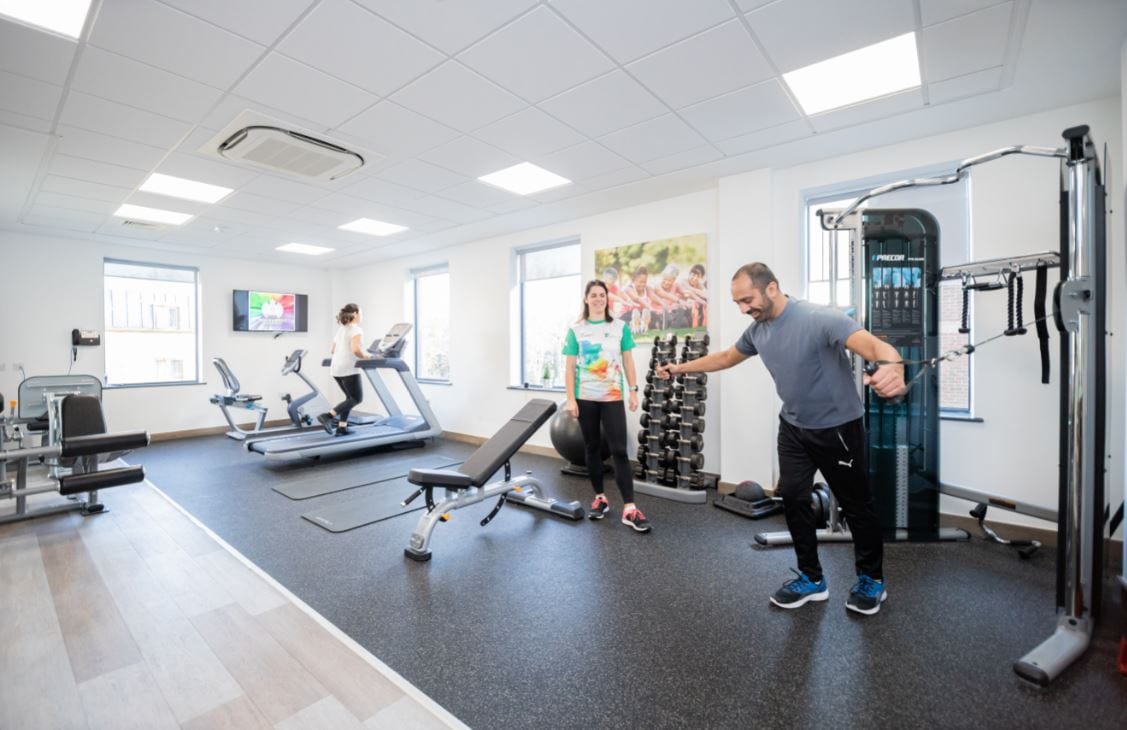- Patients
- Exploring cancer care
- Conditions we treat
- Leukaemia
- Chronic lymphocytic leukaemia treatment
Introduction
Chronic lymphocytic leukaemia treatment at GenesisCare
We are specialists in the latest techniques for diagnosing and treating all types of cancer, including chronic lymphocytic leukaemia. We have teams of highly trained cancer specialists that are experts in this disease who work together to evaluate the newest, evidence-based approaches so we can offer these to every patient – without delay.

Treatment overview
Chapter 1
Treatment overview
Treatments for chronic lymphocytic leukaemia may include chemotherapy, targeted therapy, immunotherapy, radiotherapy, surgery and transplants. We combine this with consultant-led integrative care, such as wellbeing therapies and psychological support, to help you achieve the best possible outcome. Our qualified physiotherapists and wellbeing consultants will carefully plan these therapies tailored to your needs by working with you and your consultant.
Chronic lymphocytic leukaemia (CLL) is a type of blood cancer that affects specific types of white blood cells called lymphocytes. These cells develop in the bone marrow from stem cells called lymphoid stem cells. It‘s called chronic lymphocytic leukaemia because the condition progresses slowly over time.
Chronic lymphocytic leukaemia is the most common type of leukaemia in the UK. According to Cancer Research UK, there are around 3,800 new cases diagnosed every year. It‘s more often found in older people and very rarely in children.
Other types of leukaemia are:
We are the UK‘s leading specialist private cancer care provider. By choosing us, you can be reassured that your treatment will be managed by a team of specialists working together, with you, to decide the best personalised care plan for your diagnosis.
It is our commitment to offering world-class care to every patient with cancer.
How is chronic lymphocytic leukaemia treated?
There are a number of options of treatment available for chronic lymphocytic leukaemia at GenesisCare, such as:
- Chemotherapy – anti-cancer (cytotoxic) drugs which destroy the cancerous cells
- Steroids – anti-inflammatory medication that kills the cancerous cells and improves the effectiveness of other chronic lymphocytic leukaemia treatments
- Targeted therapy – a specialised group of drugs that attack or block certain processes in the cancer cells, causing them to die
- Immunotherapy – drugs that help your body‘s immune system recognise and fight the cancer
- Radiotherapy – high-energy radiation beams which are targeted at the cancer cells
- Transplants – replace abnormal blood cells and damaged stem cells
- Surgery – removal of organs that have increased in size as they‘ve filled up with abnormal white blood cells
Make an inquiry
These web pages provide more information about chronic lymphocytic leukaemia treatment at GenesisCare. If you would like to contact us in confidence, we will be happy to answer any of your questions.
Diagnostics
Chapter 2
Diagnostics
How is chronic lymphocytic leukaemia diagnosed?
At GenesisCare, we diagnose and treat a wide range of cancers, and we understand that this can be a very worrying time. Our diagnosis services are first-class, and our commitment is to give you the answers you need, as quickly as possible. It‘s important to remember that symptoms can often be caused by other conditions, not chronic lymphocytic leukaemia. Whatever your diagnosis, we can make sure you get the expert care you need and without delay.
If you‘re concerned about chronic lymphocytic leukaemia symptoms, we offer fast access to specialist chronic lymphocytic leukaemia tests and diagnostics. We also offer a dedicated Rapid Access Haematology Service within some of our centres. Here you‘ll see one of our expert consultant haematologists who specialise in blood and bone marrow cancers. They‘ll assess your symptoms and, if necessary, refer you for diagnostic tests such as blood tests, bone marrow aspirate biopsy or an imaging scan (including ultrasound, CT and PET/CT scans). Appointments are usually available within 24 hours.
Chronic lymphocytic leukaemia symptoms
Symptoms of chronic lymphocytic leukaemia develop over time and usually become more noticeable as your body produces more immature white blood cells. Typical symptoms are common to other illnesses, so a specific chronic lymphocytic leukaemia diagnosis requires an expert opinion.
Signs may include:
- Fatigue
- Breathlessness
- High temperature and sweating
- Pale skin if you have white skin or greyish skin if you have brown or black skin
- Red or purple spots on your skin
- Bruising and bleeding
- Lumps or swelling
- Pains in your bones or joints
- Abdominal discomfort
- Repeated infections
If you have any concerns, you should seek medical advice or book an appointment through our Rapid Access Haematology Service.
Rapid Access Haematology Service
Our specialist team of haematology consultants can assess and diagnose conditions quickly so you can get the answers you need and plan any treatment immediately.

Drug treatments
Chapter 3
Drug treatments
At GenesisCare, we offer all drug therapies that can be used to treat and manage chronic lymphocytic leukaemia, including many of the newest treatments. Depending on how these treatments are given to you, you may need to attend one of our private chemotherapy suites which are staffed by our specialist nurses. Our compassionate nursing teams are available 24/7 on a dedicated on-call telephone service and can answer any queries during your treatment. They'll be able to provide advice about side effects or symptoms and help arrange appropriate medical care when needed.
Our centres have all received the Macmillan Quality Environment Mark to reflect the quality of care we provide for people living with cancer.
There are different types of drug treatments, also called systemic anti-cancer therapies. Our expert teams continually review and assess new treatments to make these available to GenesisCare patients as early as possible.
Chemotherapy for chronic lymphocytic leukaemia
Chemotherapy is the primary treatment for chronic lymphocytic leukaemia. It involves the use of cytotoxic (anti-cancer) drugs that destroy cancer cells. You may have chemotherapy on its own or in combination with other treatments such as immunotherapy.
If initial treatment doesn‘t improve your condition, you may have a course of high-dose chemotherapy. Although intensive chemotherapy can successfully treat chronic lymphocytic leukaemia, it may also mean that you‘ll need to have a bone marrow or stem cell transplant alongside this treatment.
Steroids for chronic lymphocytic leukaemia
Steroids are anti-inflammatory drugs that can be used to fight against chronic lymphocytic leukaemia. They can be given on their own to kill the leukaemia cells, or, prescribed alongside other treatments such as chemotherapy to increase its effectiveness and manage side effects.
Targeted therapy for chronic lymphocytic leukaemia
Targeted (also called biological) therapies are a specialised group of drugs that are designed to attack or block certain processes in cancer cells that tumours depend on to survive and grow. The main type of targeted therapies for chronic lymphocytic leukaemia are Bruton tyrosine kinase inhibitors and Bcl-2 inhibitors. These drugs target different proteins in leukaemia cells which are both critical in cancer cell survival, causing them to die.
Immunotherapy for chronic lymphocytic leukaemia
Immunotherapies work by helping your body‘s immune system to recognise and fight the cancer. Chronic lymphocytic leukaemia can be treated with a group of drugs called monoclonal antibodies (MABs). These work by identifying and attaching to particular proteins that are only found on the outside of lymphocytes. When the monoclonal antibodies bind to the protein, they induce direct killing of the lymphocyte cell and send signals to your body‘s immune system to locate and destroy other cancer cells.
Palliative care
If your cancer has spread to other parts of the body, it‘s called advanced or metastatic chronic lymphocytic leukaemia. At GenesisCare, you can receive palliative drug treatment for advanced chronic lymphocytic leukaemia, to reduce your cancer’s progress and ease any symptoms.
Personalised medicine
For some advanced cancers, we use specialist tests, such as liquid biopsy or genomic testing, to understand cancer cells’ genetic makeup. This helps us identify which drugs are available to work against the particular genetic mutations in a cancer, allowing us to start effective treatment without delay.
Clinical trials
There may be opportunities to access clinical trials for the newest treatments for chronic lymphocytic leukaemia. Clinical trials can be considered a suitable treatment option if you‘ve exhausted standard therapies or evidence suggests the trial treatment will be more successful at treating your condition. Your haematologist will discuss these opportunities in more detail with you.
Drug treatment side effects
No treatment is without side effects. Your doctor will explain these to you depending on your drug treatment, together with the ways your treatment plan and supportive care can help manage or minimise these.
Radiotherapy
Chapter 4
Radiotherapy
Radiotherapy uses targeted, high-energy radiation beams to destroy cancer cells. It's often a preferred treatment option for chronic lymphocytic leukaemia patients with an enlarged spleen. It can also be delivered before a transplant.
At GenesisCare we are the leading private provider of radiotherapy in the UK, and offer world-class expertise, state-of-the-art facilities and advanced radiotherapy techniques. Our latest-generation radiotherapy machines (called linacs) deliver highly targeted radiation beams that are designed to be effective while minimising the radiation dose to healthy tissues.
Your treatment will be governed by our expert multidisciplinary teams (MDTs), consisting of oncologists, radiotherapists and medical physicists. They'll work together to ensure that you receive only the best possible care.
Radiotherapy techniques for chronic lymphocytic leukaemia
Volumetric modulated arc therapy (VMAT) is a modern radiotherapy technique that directs beams of radiation in an arc across the treatment area. Together with surface-guided radiotherapy (SGRT), it‘s possible to precisely target areas of cancer, adjusting the beam and intensity of the radiation dose to allow for movements in the body and avoid healthy tissues. Side effects of radiotherapy occur when healthy tissues receive radiation, so using this technique helps to limit the dose to tissues and organs surrounding the tumour. At GenesisCare, we offer VMAT as standard to eligible chronic lymphocytic leukaemia patients with an enlarged spleen. This is because it is widely recognised to be the highest standard of care currently available for patients needing this type of radiotherapy.
Total body irradiation (TBI) delivers radiation to your whole body. It is often used to help kill leukaemia cells in the bone marrow before a bone marrow or stem cell transplant.
Side effects of radiotherapy
No treatment is without side effects. Your doctor will explain these to you before you start your course of radiotherapy, together with the ways your treatment plan and supportive care can help manage or minimise their impact.

Transplants and surgery
Chapter 5
Transplants and surgery
Transplants are often used to replace abnormal white blood cells and form part of an overall treatment plan for chronic lymphocytic leukaemia. If your consultant recommends a transplant, this can be arranged conveniently at one of our partner hospitals.
Stem cell and bone marrow transplants
Stem cells are early types of cells found in your bone marrow, and they can develop into red blood cells, white blood cells and platelets. When treating chronic lymphocytic leukaemia, stem cell and bone marrow transplants are used to replace the abnormal white blood cells.
Stem cell transplants are more common than bone marrow transplants for treating chronic lymphocytic leukaemia. You‘ll usually have what‘s called an allogeneic stem cell transplant, where the stem cells are from an appropriately matched donor.
Your consultant may suggest a transplant for chronic lymphocytic leukaemia if your condition:
- Has features that show it‘s likely to come back (high–risk)
- Has come back after treatment (relapsed)
Surgery
Some chronic lymphocytic leukaemia patients find that their spleen can increase in size as it fills up with abnormal lymphoid cells. Our consultants work closely with expert surgeons from both local and nationally renowned hospitals and will work together with other cancer specialists to decide the best course of treatment for you. If your consultant recommends spleen surgery, this can be arranged conveniently at one of our partner hospitals. You can then continue your other treatments at GenesisCare.
Transplant and surgery side effects
No treatment is without side effects. Your doctor will explain these to you, together with the ways your treatment plan and supportive care can help manage or minimise these.
Integrative care
Chapter 6
Integrative care
At GenesisCare, we do more than just treat your cancer. As part of our unique and integrative approach to cancer care, you can expect the best possible care and a personalised treatment plan that includes access to life-changing therapies which are proven to improve cancer-related outcomes. These therapies will be tailored to you to help you manage and cope with your cancer as well as the specific side effects of treatment.
Exercise medicine
Exercise medicine is a personalised programme of carefully planned and supported physical activity that has been shown to improve outcomes for cancer patients, enhancing quality of life and limiting the impact of cancer, such as by improving strength and reducing fatigue. One of our physiotherapists specialising in exercise for people living with cancer will provide a 12-week programme tailored to your needs and supported by our dedicated GenesisCare Exercise Medicine app. They’ll work closely with you to monitor changes in your health and support you throughout the programme to help you get the best results. This is available at selected GenesisCare centres.
Wellbeing
We also offer a wellbeing expert and holistic therapies such as counselling, acupuncture, massage and reflexology through our unique partnership with the Penny Brohn UK charity. This service is available to all chronic lymphocytic leukaemia patients at any of our 14 UK centres.

Why choose us?
Chapter 7
Why choose us?
GenesisCare is a leading private provider of cancer care, offering the latest innovations and techniques that are proven to be safe and effective. If you choose us for chronic lymphocytic leukaemia treatment, you'll be under the care of a team of experts, including consultant oncologists, surgeons and haematologists. They'll design a personalised care plan based around your diagnosis and preferences, with treatment starting within days if needed. Every patient is also supported through their journey with life-changing therapies, such as exercise medicine and psychological support.
Our dedicated cancer centres are convenient and easy-to-access. You can use your private medical insurance, and we‘re recognised by all leading insurers.
We are proud that so many patients rate our care as excellent as we help them through their cancer journey. Find out more about the unique experiences of people who have had their cancer diagnosis or treatment at GenesisCare in our patient stories section.
Thank you for your enquiry.
We'll be in touch during our next working day (Monday to Friday, except for bank holidays)
Form submission error
There was an error submitting this form. Please refresh your screen and try again. If this error persists, please email contactus@genesiscare.co.uk for assistance.
Read next

Doctors
Our doctors
GenesisCare works with many leading and experienced cancer doctors who share our commitment to providing excellent patient care

Centres
Our centres
With 440 centres across the world, we're continuing to diagnose and treat without delay, bringing specialist care closer to our patients in the UK, Spain, Australia and the US.

Cancer care
Exploring cancer care
We are the UK’s leading private provider of advanced radiotherapy and cancer care. We offer fast access to the latest technology and treatments that has been proven to make a difference.

Cancer care
How can we help?
Accessing world-class cancer care is easier than you think. Follow these easy steps to get treatment, tests and scans, or a second opinion at GenesisCare, and find out the different ways of funding your cancer care.

Patient support
Patient stories
We believe patients can be our teachers and trusted advisers, benefiting from their unique experiences.